Here's a class in C# to help you convert the error codes to string:
public static class WinErrors
{
#region definitions
[DllImport("kernel32.dll", SetLastError = true)]
static extern IntPtr LocalFree(IntPtr hMem);
[DllImport("kernel32.dll", SetLastError = true)]
static extern int FormatMessage(FormatMessageFlags dwFlags, IntPtr lpSource, uint dwMessageId, uint dwLanguageId, ref IntPtr lpBuffer, uint nSize, IntPtr Arguments);
[Flags]
private enum FormatMessageFlags : uint
{
FORMAT_MESSAGE_ALLOCATE_BUFFER = 0x00000100,
FORMAT_MESSAGE_IGNORE_INSERTS = 0x00000200,
FORMAT_MESSAGE_FROM_SYSTEM = 0x00001000,
FORMAT_MESSAGE_ARGUMENT_ARRAY = 0x00002000,
FORMAT_MESSAGE_FROM_HMODULE = 0x00000800,
FORMAT_MESSAGE_FROM_STRING = 0x00000400,
}
#endregion
/// <summary>
/// Gets a user friendly string message for a system error code
/// </summary>
/// <param name="errorCode">System error code</param>
/// <returns>Error string</returns>
public static string GetSystemMessage(int errorCode)
{
try
{
IntPtr lpMsgBuf = IntPtr.Zero;
int dwChars = FormatMessage(
FormatMessageFlags.FORMAT_MESSAGE_ALLOCATE_BUFFER | FormatMessageFlags.FORMAT_MESSAGE_FROM_SYSTEM | FormatMessageFlags.FORMAT_MESSAGE_IGNORE_INSERTS,
IntPtr.Zero,
(uint) errorCode,
0, // Default language
ref lpMsgBuf,
0,
IntPtr.Zero);
if (dwChars == 0)
{
// Handle the error.
int le = Marshal.GetLastWin32Error();
return "Unable to get error code string from System - Error " + le.ToString();
}
string sRet = Marshal.PtrToStringAnsi(lpMsgBuf);
// Free the buffer.
lpMsgBuf = LocalFree(lpMsgBuf);
return sRet;
}
catch (Exception e)
{
return "Unable to get error code string from System -> " + e.ToString();
}
}
}

